This article introduces projects available in Flathub with installation instructions.
Flathub is the place to get and distribute apps for all of Linux. It is powered by Flatpak, allowing Flathub apps to run on almost any Linux distribution.
Please read “Getting started with Flatpak“. In order to enable flathub as your flatpak provider, use the instructions on the flatpak site.
TurboWarp
TurboWarp is a modified version of Scratch. Scratch is a coding language with a simple visual interface that allows young people to create digital stories, games, and animations.
I love Scratch, but since I discovered TurboWarp, my son has never looked back. The interface is clearer, it has night mode, it works faster than the original Scratch, and it’s memory optimized.
You can install “TurboWarp” by clicking the install button on the web site or manually using this command:
flatpak install flathub org.turbowarp.TurboWarp
Szyszka
Szyska is file renamer with a lot of interesting features like:
- Great performance
- Available for Linux, Mac and Windows
- GUI created with GTK 4
- Multiple rules which can be freely combined:
- Replace text
- Trim text
- Add text
- Add numbers
- Purge text
- Change letters to upper/lowercase
- Custom rules
- Saved rules to be used later
- Ability to edit, reorder rules and results
- Handles hundreds thousands of records
You can install “Szyszka” by clicking the install button on the web site or manually using this command:
flatpak install flathub com.github.qarmin.szyszka
Marker
Marker is a MarkDown editor written in GTK3. It’s one of my favorites for fast writing on GTK. Some of its features are:
- HTML and LaTeX conversion of markdown documents with scidown
- Support for YAML headers
- Document classes
- Beamer/presentation mode
- Abstract sections
- Table of Contents
- External document inclusion
- Equations, figures, table and listings with reference id and caption
- Internal references
- TeX math rendering with KaTeX or MathJax
- Syntax highlighting for code blocks with highlight.js
- Flexible export options with pandoc
- RTF
- ODT
- DOCX
You can install “Marker” by clicking the install button on the web site or manually using this command:
flatpak install flathub com.github.fabiocolacio.marker
Marker is also available as rpm on fedora’s repositories
Librum
Librum is an application to manage your library and read your e-books. It’s a great way to manage a collection of books and documents, including support for a long list of formats. Some of its features are:
- A modern e-reader
- A personalized and customizable library
- Book meta-data editing
- A free in-app bookstore with more than 70,000 books
- Book syncing across all of your devices
- Highlighting Bookmarking Text search
You can install “Librum” by clicking the install button on the web site or manually using this command:
flatpak install flathub com.librumreader.librum

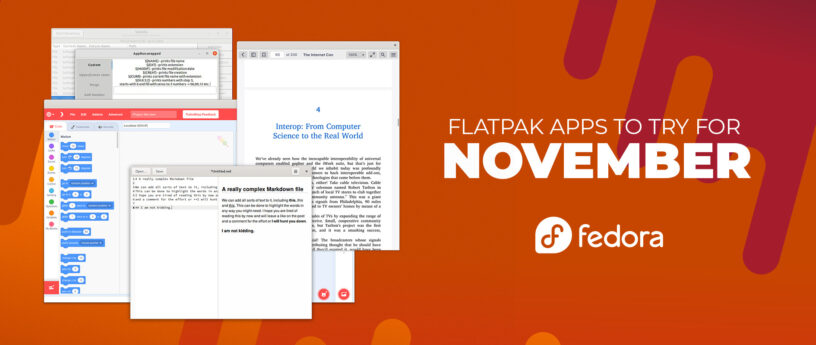
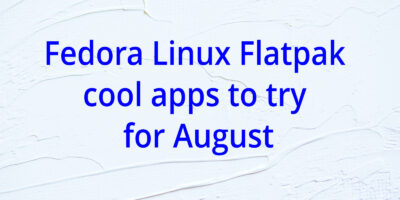
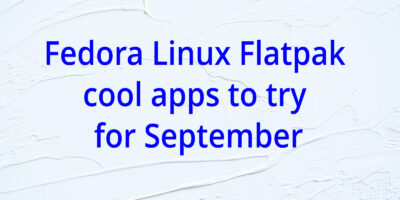

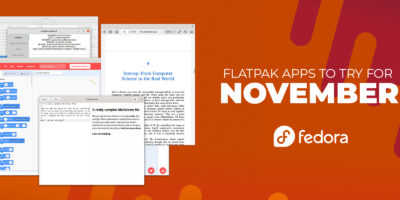

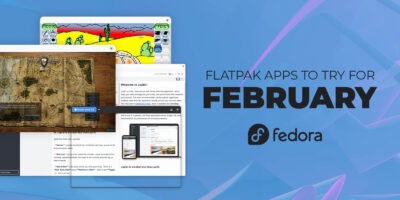

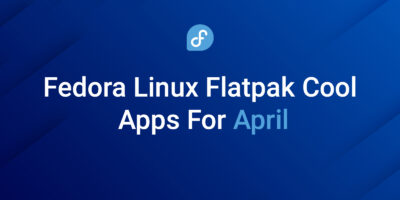
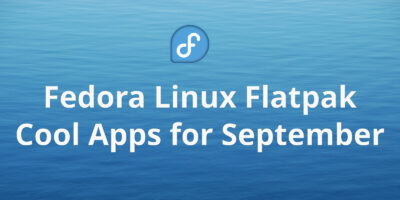
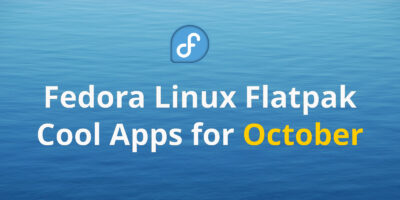
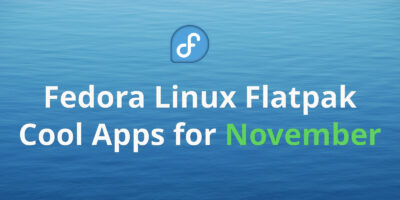

GroovyMan
If I had to give three good reasons why I only use Fedora Linux on my workstations and server, then I would give the following reasons:
– perfect managed rpm repositories
– nice support from bugzilla.redhat.com and friendly developers and teams (i.e. the podman developers led by RedHat-Daniel
– a large set of repositories that fullfill most of my needs as a developer
The reason why i dislike the MS-Windows style of application management like flathup (and others), is the matter of of fact, that a fixed bug in a glib, gtk component wont fix problems in the flat-head-packaged application, that has been installed via flatpack.
(1) flatpack in an example of … lessons not learned!
(2) marker can be loaded in the same version via rpm
(-‸ლ)
karel
Please try to learn more about “flatpak” and “flathub” (and not being able to spell it right once underscore this), there very good reason we use them (shorting delivery path, being able to sandbox applications, etc.). Of course it’s possible that they don’t suite you well, but they exist to solve real world problems.
If you still don’t find any good use for them, there’s no necessary to tell the rest (silent majority in the end) that it is not meeting your needs.
GroovyMan
Dear Karel,
i know very well the idea behind flatpack. In short: one managed glibc an some isolated installation, with their own software stack on libraries and components. Well this is nice for a fast distribution, but is is the hell for the user, who may wait a long time, until a developer wakes up to update its shipment, with a update of used library, that had a sec hole.
Karel, this is exactly the same chaos you find on any Windows-Worksation, you really want this ?
The idea of flatpak might be a solution for to make a new software available for a lot of linux users. This may be an acceptable solution for the very first time, but later it will make you a slave of the resonsability to keep the entire shipment up to date.
So as a professional developer with a build chain for the major distributions, you will be glad not to worry about stable/buggy versions of library, you are not willing to ship anymore.
And as i user i prefer rpm-packaged programs, cause they keep my whole system safe and help the distributor, to find problems as soon as possible. Its philosophy is cooperative, whereas flatpak reminds me of a loner who is enticed to ship and forget.
BadBoy
many apps are still anchored to the gnome 43 runtime. The problem is real.
GroovyMan
Salut BadBoy,
for this reason you can install gnome-43 libraries side by side of modern libraries, cause UNIX shared libs holds the version number in their filename. Thanks ELF, Linux does not have that shared-lib desaster of Windows in common.
The migration from one version to another can be easily perfomed by changing the version number of your make to the next level.
There is no problem at all!
Darvond
What if I don’t want to support the paradigm and ideas put forth by Word of Gnome? Because Gnome these days feels like the latter day splinter faction Word of Blake from Battletech. More focused on dogma and image than pushing forward any useful paradigm.
Or perhaps in a less wordy way: I don’t want any Gnome library touching my system. Is there a desktop agnostic way to accomplish this?
regeya
Forgive my ignorance, but imho it sounds like you have it completely backwards.
HelloWorld
You are not groovy, man.
Mike Breedlove
Being a novice, this is what I’m looking for when exploring for info on software.
Thx
kantrix
I think, it’s worth mentioning, that librum is completely useless without registering an account and sharing your usage data with them.
Georg
And – read the privacy policy. They collect and share data. Please don’t make advertise for software like this.
Darvond
A TL;DR:
One (glorified) e-book reader, which feels like one of those whatever things to be missing from the main repos. There’s Bookworm…and a smorgasbord PDF readers which happen to open ePub and other electronic formats.
Marker, which exists among a sea of markdown & lightweight IDEs.
And… the Bulk Rename Tool from Thunar.
The reason I went to Fedora is because I like a leading edge system with a clear structure, but given the recent shifts in culture, I’m not so sure anymore. I feel like given the breakdown in communication over projects such as DNF5 and the Fedora 39 release stalling over some minor software quibbles, that it is starting to feel the org is taking the wrong approach.
I realize much of it is community and volunteer driven, but someone needs to be in the role of making sure people are coding to an ends rather than spinning their wheels over frivolous issues.
There is a bug marked as a release blocker? That’s going to require daily communication, there is a schedule to keep.
A feature proposal? Better be presenting monthly updates. I’m trying to figure out for example, what happened to DNF5, looking at the issue tracker and codebase, and it feels like they’re reinventing the wheel not only codewise, but in terms of approach/implementation as well; instead of referencing working implementations such as Zypper. (Which is also primarily constructed of C++ and works with RPM package management.)
And if DNFdragora is supposed to be the YAST/Synaptic of Fedora, that’s not a great look either.
Richard England
If the flatpak tools presented in these articles are not suitable for you or you feel they are duplicates of other tools, or if you do not wish to use flatpaks, then the simple response is not to use them and perhaps ignore the articles in the future.
Some folks find these articles useful. Not everyone will. That’s life and free choice.
I find this an interesting (read that inappropriate) forum in which to discuss the current release delay. There are several channels in the Fedora Matrix channels that you may use to follow the details of the release. See: https://chat.fedoraproject.org/#/room/#fedora:fedoraproject.org
Anony Moose
I’d wager you to leave a Fedora installation unattended for something like two-three months and then try upgrading it via ‘dnf update’ then do the same for a, say OpenSuse Tumbleweed, via zypper. By the time Zypper updates finish you could have probably just done a clean reinstall with a newer ISO.
Tom
Recommending an app that requires account registration to use seems unusual for this blog series. Especially since the main reason for it is to track usage data. Librum even reserves the right to use your private data to contact you for any reason afaict, though I will admit to not being an expert or having read their entire privacy policy.
Marie-Rune
It is nice that you have started to use the full name Fedora Linux more now that people are finding Linux. Many times new comers can get confused as they are talked about “Linux” but then they see “Fedora” “Manjaro” “Debian” and so forth. Then they wonder “wasn’t i supposed to be using Linux”.
MX Linux and Linux Mint are great examples too because those names tell that it is indeed about Linux but different “version” for new users. Maybe that Linux word should be added to Fedora logo too in small under or so.
Gregory Bartholomew
Thanks for the suggestion Marie-Rune. This magazine is meant to present news about Fedora Linux (the operating system — new releases, new software packages, new features, etc.) and Fedora Project (news about events like Flock to Fedora and new services like Fedora Ask/Discussion and Fedora Matrix). We don’t want to limit ourselves to just the operating system (though that is the bulk of the topics that get posted here). 🙂
Roman
Nice article Eduard!
Anon Ymous the 3rd
Flat Packs are touted as this wonderful sandboxed QUBES like secure platform for applications to new people. Then, after a while. one realizes it is not really a sandbox at all, and that flatpack apps have the same problems any other linux app does. It is sad but most definitely true-, if one wants a reliable app that works simply install windows or the like and give up privacy.
Of course, Linux distros are more user friendly to the privacy minded. One does not need to sign up and provide a phone number to install a linux distro. THAT plus is negated when it seems more and more linux apps want sign ups and/or require invasive permissions. Doing things to negate the clear advantages and user experiences that linux has does one simple thing. It negates every advantage.
People feel like a child who learns there is no Santa Clause. No one likes to feel lied to, and no one likes to run unreliable apps.
The point? One of accountability. Instead of steering new people to apps that pretty much track just as much as windows apps do, at least be honest and state the pros and cons of any app.
Contrary to the communist style mind control that seems to spew from fedora magazine, people do not chose fedora desktop over windows because fedora is better. Windows apps are rock solid reliable. Your fedora app might break on the next update. That’s a fact.
Linux desktop distros like fedora have came a long way, to be sure. One does not have to be a nerd to simply install or use linux any more, and that is a great thing. RUST lang is going to make linux desktop much more secure and reliable, which will be great. Nevertheless, linux distros like fedora have NOT earned the right to start tracking people via apps and claiming the apps are more than they are. Accountability and honesty is the only way to advance. There are LOTS of people that just go back to windows and wait for a linux distro to get it right, and that is a fact.
Flatpacks would be awesome if they were actually more sandboxed as often wrongly touted. And telling ANYONE fo download an app that tracks one as much as windows is illogical..might as well just stick to windows. Lastly, admonishing people from bringing up valid complaints might work for places like china but it will NEVER make fedora better. You can tell others to go take a hike and use something else… most end up doing that anyway.
Karlis K.
I don’t get the hate in the comments, I personally love these monthly writeups of Flatpak highlights. Just the other day I was feeling adventurous to go out and explore random Flatpaks that seemed interesting or potentially useful to maybe find better ways of doing things the way I’ve been doing them. Keep up rocking Fedora Magazine crew! 🤘
Darvond
They used to be writeups of useful packages in COPR, showing what the community was interested in. And many of the packages featured have been less than impressive.
Richard England
The magazine would be pleased to have you contribute reviews of some COPR packages you feel are worthy of note.
Tommy He
To be fair, for the features that Librum offers, it’s hard to imagine to not require registering. If this is a concern, Calibre can also be found and installed via flathub.
Meanwhile, Librum offers a self-host option for the ones who want its Cloud based features with more privacy concerns.
https://github.com/Librum-Reader/Librum-Server/blob/main/self-hosting/self-host-installation.md
Jefe
Marker can be installed with “sudo dnf install marker”. Why reference flatpak when it is available in house? Fedora package install is your first choice.
Lol
Szyszka… was almost going to say it’s one of the worst names you could have used, but then I found, BUT….then I found their GitHub page 🤣🤣🤣
“Szyszka is Polish word which means Pinecone.
Why such a strange name?
Would you remember another app name like Rename Files Ultra?
Probably not.
But will you remember name Szyszka?
Well… probably also not, but when you hear this name, you will instantly think of this app.”
jakjak
I too, side with groovyman, badboy, georg, tom, Anon Yumas the 3rd, jefe.
Within this scope, it appears the magazine is fully behind flatpak. It would be wonderful to see an honest detailed contrarian view written on flatpak.
Wouldn’t you consider this critical for the open source philosophy?
Richard England
The Fedora Magazine publishes articles that are contributed by volunteers. Articles about one feature or another are not solicited. There is no attempt to “be behind” any thing, only to present accurate information that might be of interest to the community.
You may want to take note that there was a series of articles in a similar vein done about COPR packages that might be of interest to the community.
You are invited to contribute articles about tools and features that you find useful or of interest that are found in the Fedora Linux repositories. The magazine would welcome them.